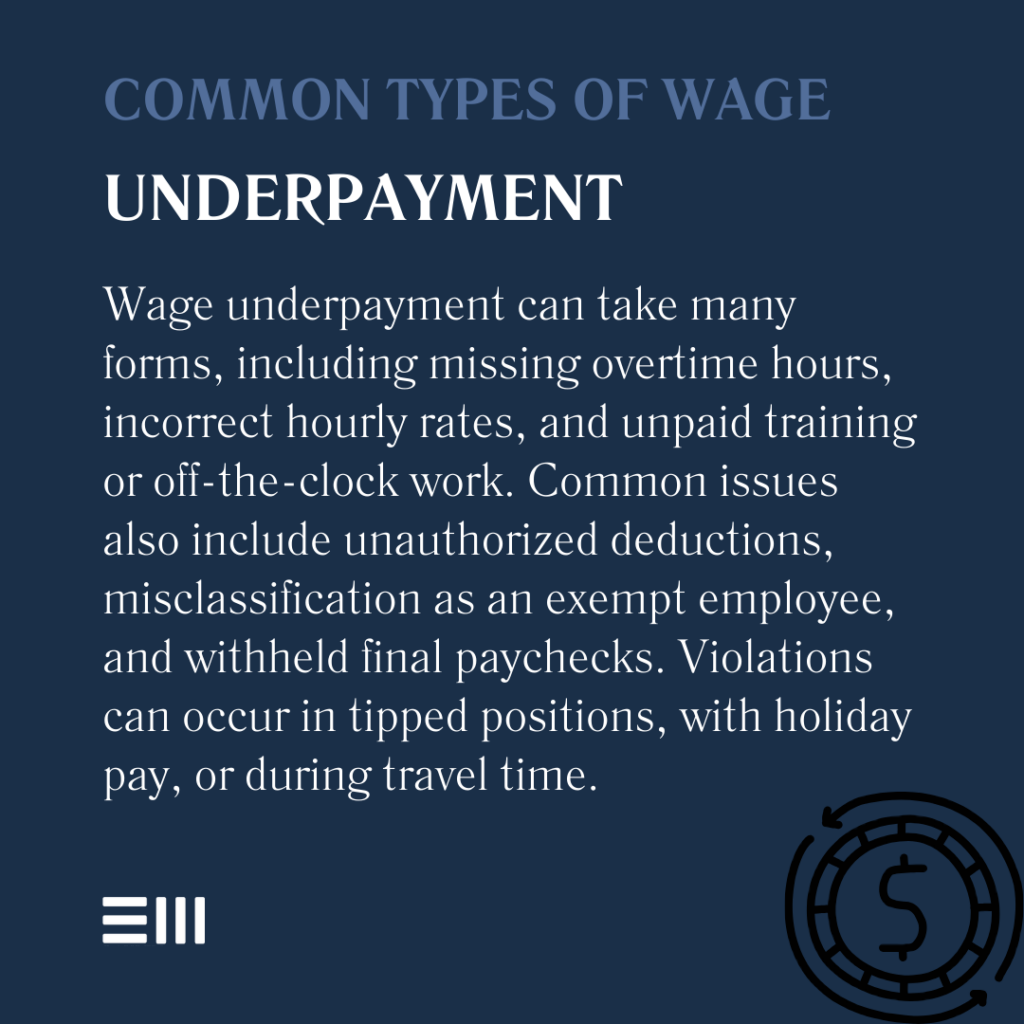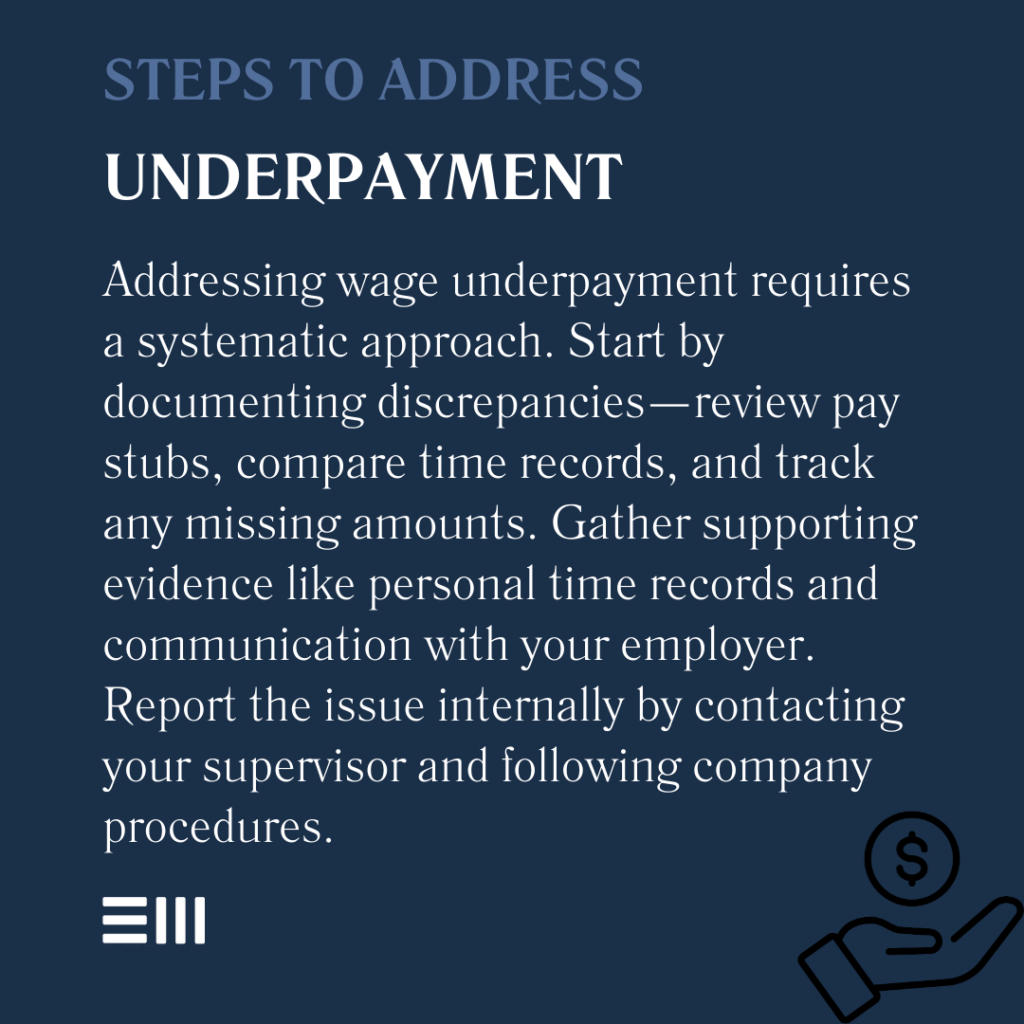
That sinking feeling in your stomach when you review your paycheck and the numbers just don’t add up.
Missing overtime hours, unauthorized deductions, or a rate lower than agreed upon—these aren’t just minor oversights, they’re violations of your fundamental right to fair compensation.
Each pay period, workers across Alabama discover discrepancies that chip away at their earned wages, from misclassified overtime to vanishing holiday pay.
Your work has value, and every dollar you’ve earned belongs in your pocket. When faced with underpayment, understanding your rights and options transforms frustration into action.
Understanding Your Wage Rights in Alabama
Before taking action, understanding your legal rights regarding wages establishes a foundation for addressing underpayment issues.
Federal laws protect workers from wage theft and provide mechanisms for recovery. These protections extend to all employees, regardless of full-time, part-time, or temporary status.
Your fundamental wage rights include:
- Payment at or above minimum wage ($7.25 per hour federal minimum);
- Overtime pay for eligible hours (1.5x regular rate);
- Timely payment of wages on scheduled paydays;
- Accurate record-keeping of all hours worked;
- Protection from unauthorized deductions;
- Equal pay for equal work regardless of gender;
- Holiday and vacation pay as promised in contracts;
- Commission payments as agreed in writing;
- Bonus payments per contract terms;
- Break time compensation when required;
- Travel time payment when applicable;
- Training time compensation;
- Final paycheck requirements; and
- Severance pay if contractually promised.
These rights form the basis for any wage claim and guide the steps you’ll take toward resolution. Understanding each component helps you identify potential violations and take appropriate action.
Common Types of Wage Underpayment
Wage underpayment takes many forms, and recognizing the type you’re experiencing helps direct your response.
Understanding these patterns helps identify violations and gather appropriate evidence. Each type may require different approaches to documentation and resolution.
Frequent underpayment scenarios include:
- Missing overtime hours on regular shifts;
- Incorrect hourly rate calculations;
- Unpaid training time or orientation hours;
- Off-the-clock work requirements;
- Misclassification as exempt employee;
- Unauthorized deductions from wages;
- Missing commission payments or adjustments;
- Withheld final paychecks after termination;
- Minimum wage violations in tipped positions;
- Tip credit violations or tip pooling issues;
- Break time violations and unpaid lunches;
- Travel time disputes between work sites;
- Unpaid preparation or cleanup time;
- Missing shift differential pay;
- Incorrect holiday pay calculations;
- Training certification compensation;
- On-call time payment disputes; and
- Meeting time compensation issues.
Each type of underpayment requires specific documentation and may involve different legal remedies. Identifying the exact nature of your underpayment strengthens your case for recovery.

Steps to Address Underpayment
Taking systematic action increases your chances of successful wage recovery. A methodical approach helps document the issue and create a clear record of your attempts to resolve it.
Follow these steps when addressing underpayment:
Document the Discrepancy:
- Review past pay stubs;
- Compare time records;
- Calculate missing amounts;
- Note relevant dates;
- Save all communications;
- Keep copies of schedules; and
- Track ongoing issues.
Gather Supporting Evidence:
- Personal time records;
- Email communications;
- Employment contract;
- Company policies;
- Witness statements;
- Pay rate notices;
- Performance reviews; and
- Training materials.
Report Internally:
- Contact immediate supervisor;
- Submit written complaint;
- Follow company procedures;
- Document all communications;
- Keep copies of reports;
- Note response times; and
- Save manager responses.
File External Complaints:
- Contact Department of Labor;
- Submit state wage claim;
- Consider legal action;
- Meet filing deadlines;
- Follow up regularly;
- Maintain documentation; and
- Track claim progress.
These steps create a clear path toward resolving wage issues while protecting your rights throughout the process.

Time Limits and Legal Deadlines for Wage Claims in Alabama
Understanding the timeframes for wage claims helps ensure you don’t lose your right to recover unpaid wages.
Different types of claims have varying deadlines that must be strictly observed, and missing these deadlines can permanently bar recovery.
Key deadlines include:
- Federal wage claims: 2 years from violation;
- Willful violations: 3 years from violation;
- State wage claims: 2 years from last payment;
- Contract violations: 6 years from breach;
- Discrimination claims: 180 days from act;
- Administrative appeals: 30 days from decision;
- Internal grievances: Varies by employer policy;
- Union grievances: Per collective agreement;
- Equal pay claims: 2 years from discovery;
- Retaliation claims: 180 days from action;
- Whistleblower claims: 90 days from event;
- State administrative claims: 1 year; and
- Federal administrative claims: 45 days.
Meeting these deadlines preserves your rights and keeps recovery options available. Each deadline type serves different purposes and may apply simultaneously to your situation.
Common Questions About Wage Recovery in Alabama
Understanding the wage recovery process helps you make informed decisions about your situation.
These answers address frequent concerns about pursuing unpaid wages and guide you through common challenges.
How Do I Calculate Unpaid Wages?
Start with these steps to determine amount owed:
- Gather all pay stubs and time records;
- Review time cards and clock-in data;
- Check pay rate agreements and changes;
- Include overtime calculations at 1.5x rate;
- Account for authorized deductions only;
- Consider premium pay for special shifts;
- Add statutory penalties where applicable;
- Calculate interest on unpaid amounts;
- Include liquidated damages if eligible;
- Factor in waiting time penalties;
- Consider meal break violations;
- Add travel time when required;
- Include training time compensation; and
- Calculate spread of hours pay.
Accurate calculations strengthen your claim and help determine appropriate recovery methods. Proper documentation supports each element of your calculation.
Can I Be Fired for Complaining About Wages?
Retaliation protections cover wage complaints:
- Federal law prohibitions;
- State law protections;
- Documentation requirements;
- Reporting procedures;
- Legal remedies;
- Burden of proof; and
- Available damages.
Understanding these protections helps you assert your rights while maintaining job security.
Should I Continue Working While Pursuing a Claim?
Consider these factors when deciding:
- Financial needs;
- Job market conditions;
- Workplace atmosphere;
- Documentation access;
- Legal implications;
- Alternative employment; and
- Recovery timeline.
Each situation requires careful evaluation of personal circumstances and legal options.
What Evidence Do I Need to Prove Underpayment?
Strong claims require supporting documentation:
- Time cards or records;
- Pay stubs and checks;
- Written agreements;
- Employee handbooks;
- Communication records;
- Witness statements; and
- Performance reviews.
Thorough documentation increases your chances of successful wage recovery.
Protect Your Right to Fair Pay
When you’ve discovered wage underpayment, taking prompt action protects your rights and improves recovery chances.
Our experienced employment law team understands the complexities of wage laws and how to navigate recovery procedures effectively.
Let us help secure your earned wages. Our dedicated attorneys will:
- Review your documentation;
- Calculate proper payments;
- Identify violations;
- File necessary claims;
- Negotiate with employers;
- Protect against retaliation;
- Pursue legal remedies;
- Handle agency proceedings; and
- Maximize recovery options.
Contact our office today for a confidential consultation about your wage claim.
Learn how we can help ensure you receive every dollar you’ve earned.
Can't find what you're looking for? Search our site below.










